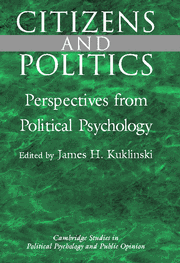Book contents
- Frontmatter
- Contents
- List of Contributors
- Prologue: Political Psychology and the Study of Citizens and Politics
- PART I AFFECT AND EMOTIONS
- PART II POLITICAL COGNITION
- PART III POLITICAL ATTITUDES AND PERCEPTIONS
- Introduction
- 9 Public Opinion and Democratic Politics: The Problem of Nonattitudes and Social Construction of Political Judgment
- 10 Implications of a Latitude-Theory Model of Citizen Attitudes for Political Campaigning, Debate, and Representation
- 11 Where You Stand Depends on What You See: Connections Among Values, Perceptions of Fact, and Political Prescriptions
- 12 Commentary: The Meaning of “Attitude” in Representative Democracies
- PART IV POLITICAL VALUES
- Index
- Titles in the series
10 - Implications of a Latitude-Theory Model of Citizen Attitudes for Political Campaigning, Debate, and Representation
Published online by Cambridge University Press: 07 October 2011
- Frontmatter
- Contents
- List of Contributors
- Prologue: Political Psychology and the Study of Citizens and Politics
- PART I AFFECT AND EMOTIONS
- PART II POLITICAL COGNITION
- PART III POLITICAL ATTITUDES AND PERCEPTIONS
- Introduction
- 9 Public Opinion and Democratic Politics: The Problem of Nonattitudes and Social Construction of Political Judgment
- 10 Implications of a Latitude-Theory Model of Citizen Attitudes for Political Campaigning, Debate, and Representation
- 11 Where You Stand Depends on What You See: Connections Among Values, Perceptions of Fact, and Political Prescriptions
- 12 Commentary: The Meaning of “Attitude” in Representative Democracies
- PART IV POLITICAL VALUES
- Index
- Titles in the series
Summary
Political public opinion can be expressed either positively or negatively. A positively expressed attitude endorses a particular policy from among a range of options for a given issue. Favoring a reduction in defense spending or a prohibition of late-term abortions are both positively expressed attitudes. A negatively expressed attitude on an issue indicates what one does not want to happen and is difficult to portray as crisply. With respect to defense spending, for example, one might feel: “No increase is needed; any more than a slight increase would be damaging; drastic cuts are also unreasonable; even some moderate cuts are worrisome.” Here one rules out disliked positions and is left with a set of options ranging from inoffensive at worst to desirable at best. Politicians retain some latitude to endorse policies from within this range of non-objectionable options without alienating the voter.
Whatever virtue negatively expressed attitudes may have – such as more accurately reflecting the way people think about many issues – they are messy, disturbingly provisional, and difficult to summarize across persons. Academic and political observers have avoided them; while recognizing that negative information may play strong roles in determining political attitudes (Lau, 1982), they construct the attitudes themselves as positively expressed. Elsewhere (Diamond and Cobb, 1996), I argue that modeling political attitudes in this unwieldy, imprecise, negatively expressed fashion greatly aids our understanding of real voters' conceptions of real candidates.
- Type
- Chapter
- Information
- Citizens and PoliticsPerspectives from Political Psychology, pp. 289 - 312Publisher: Cambridge University PressPrint publication year: 2001
- 4
- Cited by



